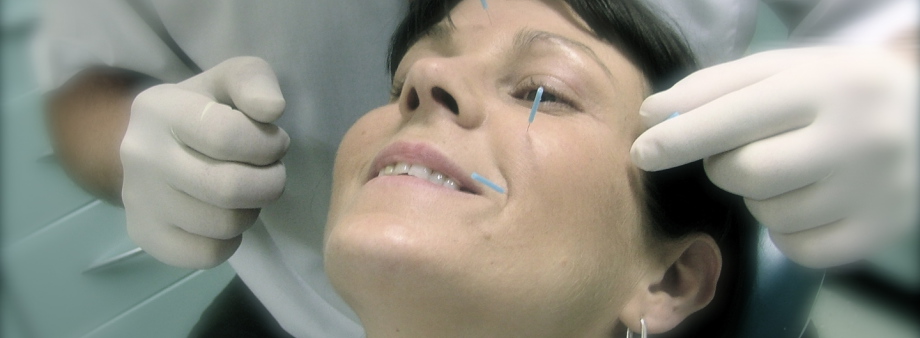
Information for patients
- Why acupuncture?
- What is it?
- How can it help?
- Will it work for me?
- Are there any side effects?
These are all questions that are asked by patients when deciding to have acupuncture treatments. This section will attempt to answer these and other questions. Inevitably there maybe some further information that you may need, for which you should speak to your dentist, or contact us via the contacts page.
Acupuncture is a medical treatment that has evolved over thousands of years, and takes much of it's traditional core concepts from traditional Chinese medicine. However over the more recent past there has been much interest within western medicine in the way acupuncture functions, and how it might help patients. As a consequence a wide range of western medically trained practitioners, from anaesthetists to physiotherapists to dentists now use acupuncture as part of their overall management plans for patients.
Acupunture is practiced from two broad approaches: a tradtional Chinese approach, and a western medical approach. Despite differences in the underlying concepts and theories for the action of acupuncture, the aims are the same - to improve symptoms. The most important part of the process is, however, a diagnosis. It is impossible for any practitioner to provide a plan for your treatment without this essential stage. As a patient, therefore, you must be prepared for a number of investigations to help establish the diagnosis for your symptoms before commencing treatment. The importance of the diagnosis cannot be overemphasised.
For many conditions, acupuncture can provide a very good outcome, either improving, or eliminating symptoms. Conditions that are most amenable to acupuncture appear to be musculoskeletal conditions i.e. conditions of joints and muscles. This can include arthritis in some cases. However acupuncture can also produce some other and exciting changes that help people; a good example of this is the control of motion sickness, which responds very well to acupuncture.
However it is important to realise that, in some cases, acupuncture is not the appropriate treatment.
- What does it involve?
During a treatment, acupuncture involves the insertion of fine needles into the body. For most dental treatments generally these will be in the head and neck area, although sometimes arms, hands, or feet may be used. These are stimulated by hand or a gentle electric current. The treatment session is generally 15 - 25 minutes long, and uses between about 6 and 12 needles. For some patients, the needling can be painful, but many say it is sore without being very painful. In some cases there is virtually no sensation.
During the treatment session, your dentist may do some other dental treatment. This is quite reasonable to do, and acupuncture can be helpful to enhance the outcomes of your treatment. Sometimes the positions of the needles can seem strange, but there are specific patterns for many treatments.
- Will it work for me?
We can show by experiment that acupuncture works, and that the results are not simply due to the placebo effect. Modern research has shown that acupuncture can work on most of the body’s systems. Needles stimulate the nervous system, to produce a number of effects, modifying the way pain signals are felt, and releasing natural painkillers – endorphin & serotonin - in the nervous system - both locally at the site of needleing, and in the central part of the nervous system, and brain. Acupuncture also helps to reduce spasm in muscles, allowing better blood flow, to improve function and reduce pain. But acupuncture does more than just control pain, it has a generally beneficial effect on health - many patients feel better in general, and sleep better following a treatment
People will respond to acupuncture in their own way. Some patients notice an immediate improvement; some find that several treatments are needed before the full effect is felt. There are some that do not respond to this type of treatment. Generally about 70% of patients show some benefits. However it is important to remember that about 10 - 15% of patients will show no reponse at all.
- What about after the treatment?
Many patients feel a little tired after a treatment. Occasionally the acupuncture sites may feel slightly bruised for 24 hours or so, and occasionally an obvious bruise can appear - which will disappear over a few days. It is not uncommon for patients to notice other changes, for example their back pain improves, or other aches change and become more obvious as the major problem is treated and improves. If you have any worries please ask your dentist.
- Are there any risks?
Acupuncture is generally considered a safe treatment, and actually has few significant risks when practiced by dentists. The most common is a temporary exacerbation of symptoms - which is often considered a good sign - but occasionally some bruising can appear. In some conditions, such as Rheumatoid Arthritis, and Trigeminal Neuralgia, acupuncture may worsten the condition, although things usually return to normal after a while.
- Who should I see?
Members of the BDAS have all received specific training in acupuncture techniques to give you the best results. As fully qualified dentists they are able to provide you with the benefits of both acupuncture and conventional treatments. They are fully conversant with such important areas as hygiene where dentists work very hard to ensure high levels of infection control in their practices, and medical implications of your condition.
One important point to remember is that different dentists will take different approaches to your treatment.
- How much will it cost?
This depends on the practice. Your dentist will tell you the cost of your treatment. Please ask if you are unsure about anything.
